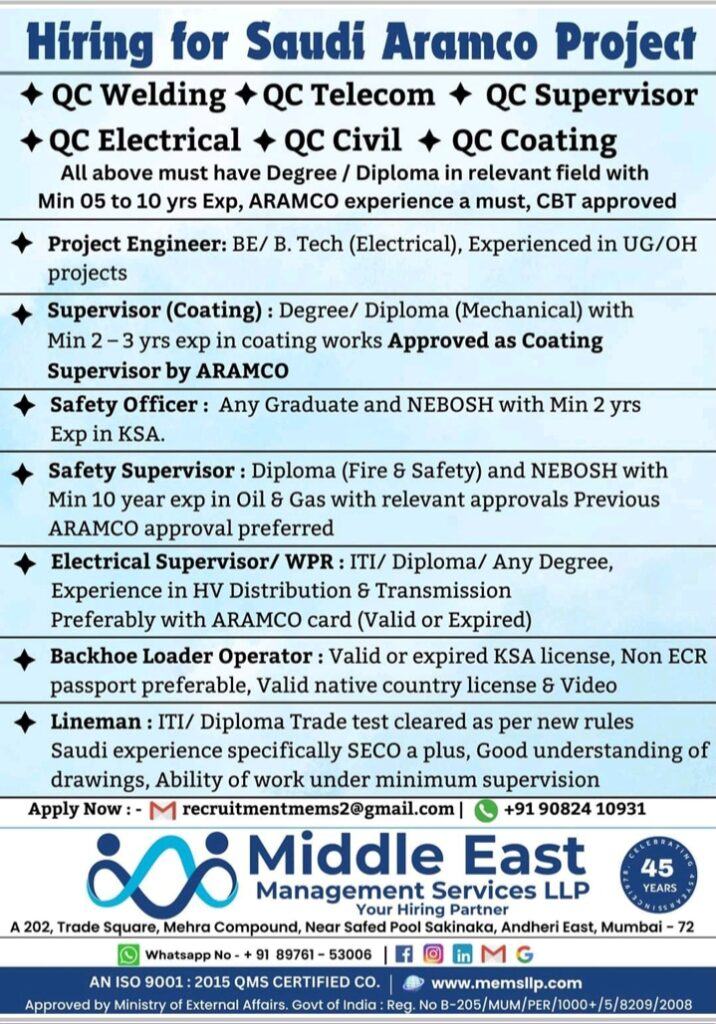
Safety Officer and Safety Supervisor Hiring for Saudi Aramco Project
Introduction
Saudi Aramco, the world’s largest oil producer, is a behemoth in the energy industry. Its projects are massive, complex, and highly influential, not only within Saudi Arabia but globally. Given the scale and scope of their operations, safety is paramount. Ensuring the well-being of employees, contractors, and the environment is non-negotiable. This is where the roles of safety officers and safety supervisors become critical. These professionals are the backbone of maintaining high safety standards in all Aramco projects.
Understanding the Roles
What Does a Safety Officer Do?
Responsibilities and Daily Tasks:
A safety officer’s primary responsibility is to ensure that the workplace complies with health and safety regulations. This involves conducting regular inspections, identifying potential hazards, and implementing corrective measures. They are also tasked with training employees on safety protocols, conducting risk assessments, and investigating any incidents or accidents.
Required Qualifications and Skills:
Typically, a safety officer should hold a degree in occupational health and safety or a related field. Certifications such as NEBOSH (National Examination Board in Occupational Safety and Health) or OSHA (Occupational Safety and Health Administration) are highly valued. Skills in communication, problem-solving, and attention to detail are crucial for this role.
What Does a Safety Supervisor Do?
Key Duties and Responsibilities:
A safety supervisor oversees the safety officers and ensures that all safety policies and procedures are strictly followed. They coordinate safety programs, manage safety audits, and act as a liaison between management and safety personnel. Supervisors also play a key role in emergency response planning and execution.
Necessary Qualifications and Skills:
A safety supervisor should possess advanced qualifications in health and safety management. Extensive experience in safety roles, often upwards of five years, is typically required. Strong leadership skills, the ability to make quick decisions, and a deep understanding of safety regulations are essential.
Hiring Process for Saudi Aramco
Recruitment Strategies
Internal Recruitment:
Saudi Aramco often promotes from within, leveraging the experience and loyalty of its existing workforce. This approach ensures that employees are familiar with the company’s culture and safety standards.
External Recruitment:
To bring in fresh perspectives and expertise, Aramco also recruits externally. This includes hiring from a global pool of qualified professionals, ensuring they get the best talent available.
Selection Criteria
Educational Requirements:
Candidates typically need a degree in a relevant field such as occupational health and safety, engineering, or environmental science. Advanced degrees and certifications add significant value to an applicant’s profile.
Experience and Expertise:
Hands-on experience in safety management is critical. For safety officers, 2-3 years of relevant experience might be sufficient, whereas safety supervisors might need 5-10 years of experience in similar roles.
Application Process

Safety Officer and Safety Engineer Hiring for Saudi Arabia: NEBOSH + IOSH / OSHA
Safety Engineers Required for Aramco Project: Saudi
09 NEBOSH Safety Officers Urgently Required in Saudi Arabia
10 HSE Officer Required in Qatar: Free Recruitment – Online Interview
L&T Good News: Apply for Safety Engineer Permanent Jobs in L&T Construction
Training and Development
Initial Training Programs
Induction Training:
New hires undergo comprehensive induction training that covers Aramco’s safety protocols, company policies, and operational procedures. This training ensures that all employees start with a solid understanding of the company’s expectations.
Safety Protocol Training:
Specialized training sessions focus on specific safety protocols relevant to the project site. This includes emergency response drills, equipment handling procedures, and hazard recognition.
Continuous Professional Development
Ongoing Training Sessions:
Regular training sessions are conducted to keep employees updated on the latest safety practices and regulations. These sessions are crucial for maintaining high safety standards.
Certifications and Courses:
Aramco encourages its employees to pursue further certifications and courses. This continuous learning approach helps in enhancing their skills and staying abreast of industry advancements.
Challenges and Solutions
Common Challenges in Safety Management
Communication Barriers:
With a diverse workforce, language and cultural differences can pose significant challenges. Miscommunication can lead to misunderstandings and safety breaches.
Cultural Differences:
Different cultural backgrounds mean varying attitudes towards safety. Some employees might not fully understand the importance of strict adherence to safety protocols.
Effective Solutions
Training Programs:
Tailored training programs that address cultural differences and language barriers are essential. These programs should emphasize the importance of safety and how everyone plays a role in maintaining it.
Team Building Activities:
Encouraging teamwork and fostering a culture of open communication can bridge gaps. Regular team-building activities can enhance mutual understanding and cooperation.
Benefits of Working on Saudi Aramco Projects
Career Growth Opportunities
Promotions and Raises:
Aramco values talent and hard work. Employees demonstrating exceptional performance can expect promotions and salary increases, providing a clear career progression path.
Skill Development:
Working on large-scale projects with cutting-edge technology offers immense opportunities for skill enhancement. Employees can learn from experts and gain invaluable experience.
Competitive Salaries and Benefits
Salary Structure:
Aramco offers competitive salaries that are often above industry standards. This financial incentive attracts top talent from around the world.
Additional Benefits:
Beyond salaries, Aramco provides comprehensive benefits, including health insurance, housing allowances, and educational assistance for employees’ children.
Conclusion
The roles of safety officers and safety supervisors are critical in ensuring the success and safety of Saudi Aramco projects. From stringent recruitment processes to comprehensive training and development programs, Aramco leaves no stone unturned in maintaining the highest safety standards. These roles offer not only professional growth and competitive salaries but also the satisfaction of contributing to one of the world’s most significant energy projects. For those aspiring to join, understanding the requirements and preparing accordingly is key.
FAQs
What is the primary role of a safety officer in a Saudi Aramco project?
The primary role of a safety officer is to ensure compliance with health and safety regulations, conduct inspections, and implement safety measures.
What qualifications are necessary to become a safety supervisor?
A safety supervisor typically needs advanced qualifications in health and safety management and extensive experience in safety roles.
How does Saudi Aramco ensure the safety of its employees?
Saudi Aramco ensures safety through rigorous training programs, regular safety audits, and strict adherence to safety protocols.
What are the benefits of working as a safety professional with Saudi Aramco?
Benefits include competitive salaries, career growth opportunities, comprehensive health benefits, and skill development.